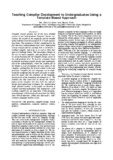Teaching compiler development to undergraduates using a template based approach
Abstract
Compiler Design remains one of the most dreaded courses in any undergraduate Computer Science curriculum, due in part to the complexity and the breadth of the material covered in a typical 14-15 week semester time frame. The situation is further complicated by the fact that most undergraduates have never implemented
a large enough software package that is needed for a working compiler, and to do so in such a short time span is a challenge indeed. This necessitates changes in
the way we teach compilers, and specifically in ways we set up the project for the Compiler Design course at the undergraduate level. We describe a template based
method for teaching compiler design and implementation to the undergraduates, where the students fill in the blanks in a set of templates for each phase of the compiler, starting from the lexical scanner to the code
generator. Compilers for new languages can be implemented by modifying only the parts necessary to implement the syntax and the semantics of the language, leaving much of the remaining environment as is. The
students not only learn how to design the various phases of the compiler, but also learn the software design and engineering techniques for implementing large software systems. In this paper, we describe a
compiler teaching methodology that implements a full working compiler for an imperative C-like programming language with backend code generators for MIPS, Java Virtual Machine (JVM) and Microsoft’s .NET
Common Language Runtime (CLR).

